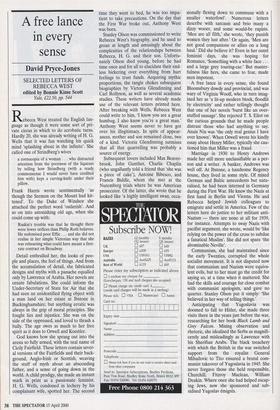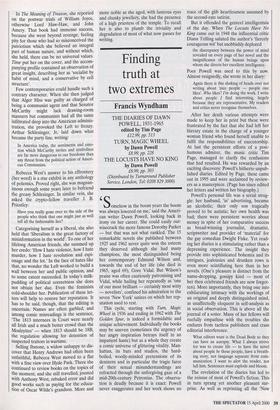A free lance in every sense
David Pryce-Jones
SELECTED LE 1 I ERS OF REBECCA WEST edited by Bonnie Kinn Scott Yale, £22.50, pp. 544 Rebecca West treated the English lan- guage as though it were some sort of pri- vate circus in which to do acrobatic turns. Hardly 20, she was already writing of H. G. Wells that it was fun watching his quick mind 'splashing about in the infinite'. She called one of Strindberg's wives
a cornucopia of a woman. . . who distracted attention from the poorness of the liqueurs by telling how Strindberg (with a ready commonsense I would never have credited him with) kept a carving-knife under their pillow.
Frank Harris wrote sentimentally 'as though the Sermon on the Mount had kit- tened'. To the Duke of Windsor she attached the perfect word `ostlerish'. And so on into astonishing old age, when she could come up with:
Ruskin's trouble was that he thought there were fewer orifices than Philip Roth believes. He sodomised poor Effie . .. and she did not realise in her simple Victorian way that she was rehearsing what could have meant a first- rate contract on Broadway.
Detail enthralled her, the looks of peo- ple and places, the feel of things. And from the accumulation of detail, she fabricated designs and myths with a panache equalled only by Lawrence of Arabia. Her novels are ornate fabulations. She could inform the Under-Secretary of State for Air that she had seen an unidentified flying object with a man land on her estate at Ibstone in Buckinghamshire; but anything erratic was always in the grip of moral principles. She fought lies and injustice. She was on the side of the oppressed, and loved to thrash a bully. The age owes as much to her free spirit as it does to Orwell and Koestler.
God knows how she sprang out into the arena so fully armed, with the real name of Cicily Fairfield. These letters contain sever- al versions of the Fairfields and their back- ground, Anglo-Irish or Scottish, weaving the stuff of myth about an absconding father, and a sense of going down in the world. A child prodigy, she made an instant mark in print as a passionate feminist. H. G. Wells, condoned in lechery by his complaisant wife, spotted her. The second time they went to bed, he was too impa- tient to take precautions. On the day that the First War broke out, Anthony West was born.
Stanley Olson was commissioned to write Rebecca West's biography, and he used to groan at length and amusingly about the complexities of the relationships between Rebecca, H. G. and their son. Unfortu- nately Olson died young, before he had time once and for all to elucidate their end- less bickering over everything from hurt feelings to trust funds. Acquiring mythic proportions, the tangle chokes subsequent biographies by Victoria Glendinning and Carl Rollyson, as well as several academic studies. These writers have already made use of the relevant letters printed here. After breaking with Wells, Rebecca West could write to him, 'I know you are a great humbug. I also know you're a great man.' Anthony West seems never to have got over his illegitimacy. In spite of appear- ances, mother and son remained close, two of a kind. Victoria Glendinning surmises that all that quarrelling was probably a source of energy.
Subsequent lovers included Max Beaver- brook, John Gunther, Charlie Chaplin (who ungallantly told a friend that 'she was a piece of cake'), Antoine Bibesco, and Francis Biddle, whom she met at the Nuremberg trials where he was American prosecutor. Of the latter, she wrote that he looked like 'a highly intelligent swan, occa- sionally flexing down to commune with a smaller waterfowl'. Numerous letters describe with sarcasm and brio many a dizzy wooer, and some would-be rapists. 'Men are all filth,' she wrote, 'they punish women they lust after.' Or again, 'Men are not good companions or allies on a long haul.' Did she believe it? Even in her outré feminist days, she was hoping for Romance, 'Something with a white face . . . and a large grey touring-car,' But master- fulness like hers, she came to fear, made men impotent.
A free lance in every sense, she found Bloomsbury dowdy and provincial, and was wary of Virginia Woolf, who in turn imag- ined her as 'a lit-up modern block, floodlit by electricity' and rather tellingly thought that one of her novels 'burst like an over- stuffed sausage'. She rejected T. S. Eliot on the curious grounds that he made people distrust those who had anything to say. Anais Nin was 'the only real genius I have ever known'. When Orwell wrote his kindly essay about Henry Miller, typically she cau- tioned him that Miller was a fraud.
Marriage in 1930 to Henry Andrews made her still more unclassifiable as a per- son and a writer. A banker, Andrews was well off. At Ibstone, a handsome Regency house, they lived in some style. Of mixed German and Baltic antecedents but natu- ralised, he had been interned in Germany during the First War. He knew the Nazis at first hand in Berlin and Vienna. He and Rebecca helped Jewish colleagues to emigrate and settle in America. Few of the letters here do justice to her militant anti- Nazism — there are none at all for 1939, for instance. Attempts to sway Nazis with pacifist argument, she wrote, would be 'like relying on the power of the cross to subdue a fanatical Muslim'. She did not spare 'the abominable Neville'.
Communism, she had maintained since the early Twenties, corrupted the whole socialist movement. It is not disputed now that communism and Nazism were equiva- lent evils, but to her must go the credit for saying so, at a time when it mattered. She had the skills and courage for close combat with communist apologists, and gave no quarter. Stanley Olson put it simply: 'She believed in her way of telling things.'
Anticipating that Yugoslavia was doomed to fall to Hitler, she made three visits there in the years just before the war, researching for her book Black Lamb and Grey Falcon. Mixing observation and rhetoric, she idealised the Serbs as magnifi- cently and misleadingly as Lawrence with his Sherifian Arabs. The black treachery with which the British in the war switched support from the royalist General Mihailovic to Tito ensured a brutal com- munist takeover of Yugoslavia in 1945. She never forgave those she held responsible, Churchill, Fitzroy Maclean, William Deakin. Where once she had helped escap- ing Jews, now she sponsored and sub- sidised Yugoslav emigres. In The Meaning of Treason, she reported on the postwar trials of William Joyce, otherwise Lord Haw-Haw, and John Amery. That book had immense success, because she went beyond revenge, feeling pity for those who had so misconceived the patriotism which she believed an integral part of human nature, and without which, she held, there can be no universal values. Time put her on the cover, and the accom- panying profile contained an observation of great insight, describing her as 'socialist by habit of mind, and a conservative by cell structure'.
Few contemporaries could handle such a contrary character. When she then judged that Alger Hiss was guilty as charged of being a communist agent and that Senator McCarthy might lack drawing-room manners but communists had all the same infiltrated deep into the American adminis- tration, she provoked the Left to frenzy. Arthur Schlesinger, Jr, laid down what became the party line, writing: In America today, the sentiments and emo- tion which McCarthy invites and symbolises are far more dangerous to our freedoms than any threat from the political action of Ameri- can Communists.
Rebecca West's answer to his effrontery (her word) is a star exhibit in any anthology of polemics. Proved right, she was magnan- imous enough some years later to befriend the greasy Schlesinger. In similar vein, she asked the crypto-fellow traveller J. B. Priestley: Have you really gone over to the side of the people who think that one might just as well tell all the fashionable lies?
Categorising herself as a liberal, she also held that 'liberalism is the great factory of misinformation in the world'. To one of her lifelong American friends, she summed up her credo: 'How I hate violence, how I hate murder, how I hate revolution and espi- onage and the lot.' In the face of hates like that, no wonder the Left worked to build a wall between her and public opinion, and to some extent succeeded. In today's milk- pudding of political correctness she does not obtain her due. Even the feminists cold-shoulder her. Publication of these let- ters will help to restore her reputation. It has to be said, though, that the editing is uncertain. Names are often garbled, and among comic misreadings is the sentence, 'The 1813 internees in Court were nearly all Irish and a much better crowd than the Mosleyites' — when 1813 should be 18B, the regulation allowing for detention of suspected traitors in wartime.
Selling Ibstone, a widow unhappy to dis- cover that Henry Andrews had often been unfaithful, Rebecca West moved to a flat with a fine view over Hyde Park. There she continued to review books on the topics of the moment, and she still travelled, jousted with Anthony West, rebuked error and did good works such as paying for the educa- tion of Oscar Wilde's grandson. More and more noble as she aged, with lustrous eyes and chunky jewellery, she had the presence of a high priestess of the temple. To recall her is also to plumb the triviality and degradation of most of what now passes for writing.



































































 Previous page
Previous page